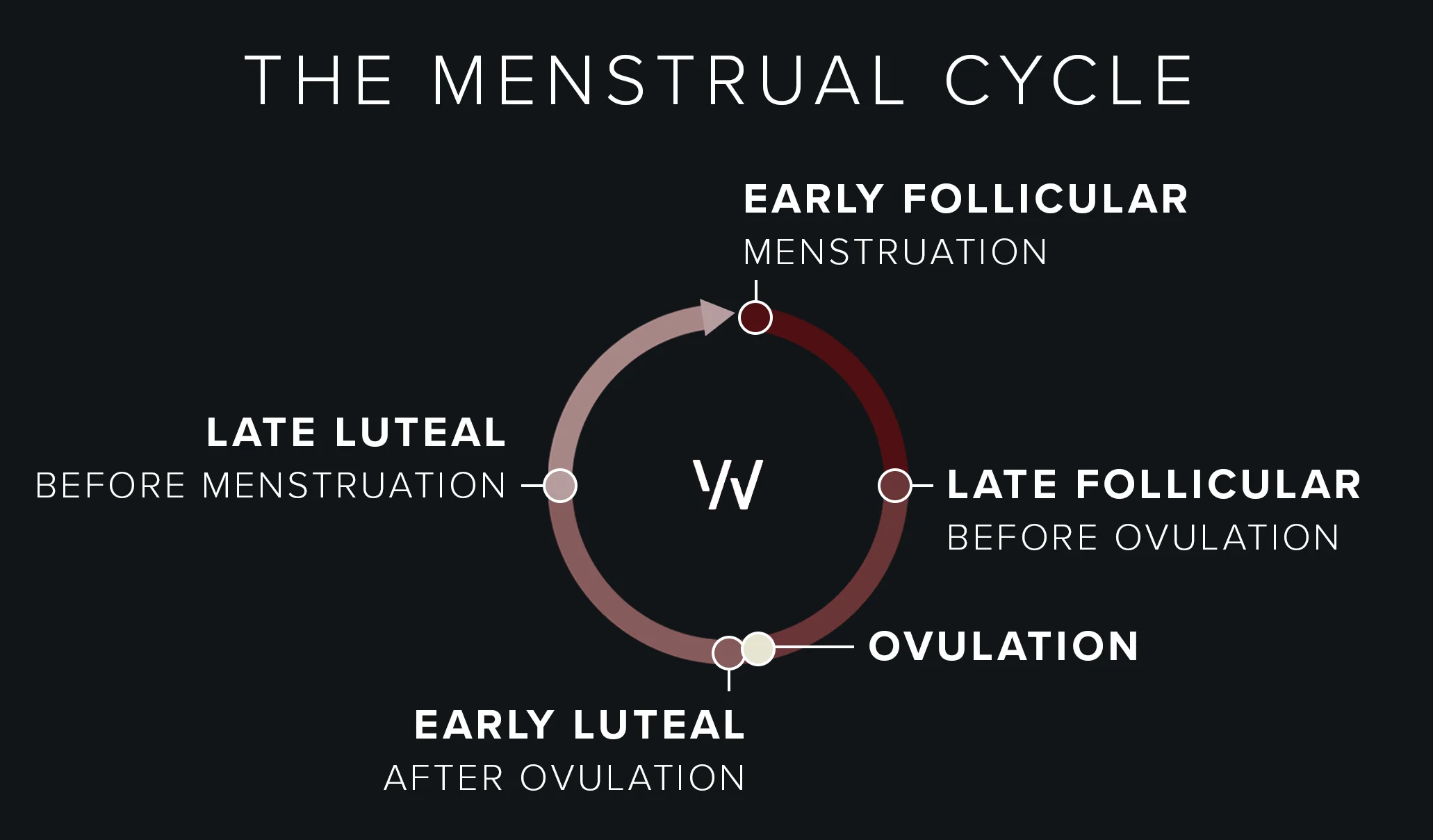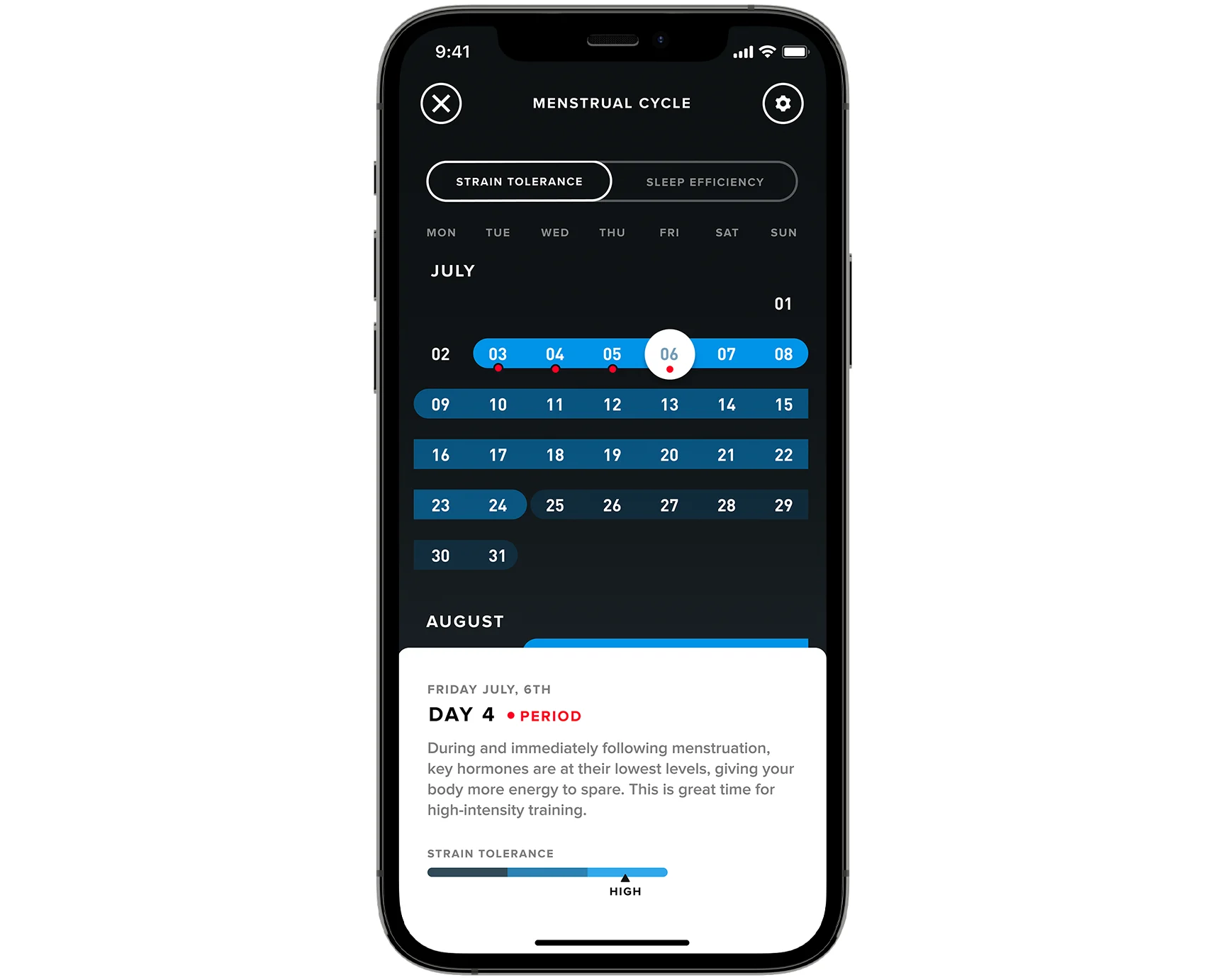Topics
- Article
- Women’s Performance
Does Exercise Help Period Cramps? FAQs About Menstruation

We’ve compiled some of the most commonly asked questions we get about periods and the menstrual cycle, menopause, exercise and fitness, and answered them here.
The menstrual cycle starts in your teens and continues for about 40 years! But many of us, regardless of age, still have questions we’re uncomfortable asking about periods, menopause, and how to fit exercise into our cycles. We’ve gathered the most popular questions WHOOP members ask us and answered them in one spot.
Does exercise reduce period cramps?
Yes! Working out during your period can relieve cramps, boost your mood, and reduce other symptoms by releasing endorphins which block pain receptors in your brain. Aerobic exercise such as running, or even a brisk walk, helps reduce the inflammation that causes cramps and can release enough endorphins to provide some relief. Regular exercise also increases blood flow to your uterus, which can cramp so hard that it cuts off blood flow, sending pain signals to the brain.
What should I be doing to fight fatigue during my period?
Periods can come with unwanted symptoms and feeling tired is one of them. Fatigue is caused when levels of hormones including estrogen, progesterone, and serotonin decrease after ovulation during the late luteal stage or your period. Low hormones can lead to inflammation, feeling sad or anxious, poor sleep, and decreased energy levels. Estrogen levels continue to be low through menstruation and can leave you feeling tired. In addition, very heavy periods may lead to iron deficiency, which can also cause fatigue. Taking omega 3 fatty acids, magnesium, or zinc supplements may help counter the symptoms. Your doctor can also order a blood test to see if you have an iron deficiency, and then prescribe an iron supplement if you do.

The menstrual cycle has two phases: follicular and luteal. Ovulation separates the follicular and luteal phases and Menstruation denotes the beginning of the follicular phase.
I lack motivation to work out on my period, how do I combat this?
Low motivation often comes from fluctuations in hormone levels in the luteal stage of your cycle as estrogen and progesterone levels begin to fall. These hormones affect neurotransmitters including serotonin and dopamine, which influence mood, motivation, and sleep. You might feel sad or anxious, irritable, or lack motivation. Levels of all four hormones begin rising again after the onset of your period, but it may take a few days before you begin feeling better. But, while you might not be motivated to work out during your period, there are benefits to doing so. Your body is prepared to work harder during your period than at any other time during your cycle. Additionally, you can gain more muscle mass and burn more fat than usual during this time of month. You may also feel more recovered the next day after a hard workout during your period. If you’re not feeling motivated to try your full workout routine, Dr. Stacy Sims suggests trying short bursts of interval training. “Something like 20 seconds all out 5-8 times with 2 minutes’ cruise between, then call it. The super-intense work will increase post-exercise anti-inflammatory responses, release endorphins, and because it is short, it is not as taxing mentally or physically as doing a full structured workout.” Read more: Why You Should Work Out During Your Period
Why am I always in the yellow in the first few days of my period?
The WHOOP recovery metrics are based on nightly changes in sleep, HRV, resting heart rate, and respiratory rate. Recovery is a personalized metric. In general recovery in the late luteal stage will be lower compared to the follicular stage.
How do I change my exercise habits once I don't have a cycle anymore?
When you enter perimenopause (the transition stage before menopause), the most important thing is to track your symptoms, your sleep, and how you’re feeling. Sims suggests changing your workouts to a three-week program. She recommends two weeks of intense training such as HIIT and heavy weight lifting, and one week of low-intensity aerobic work. For those past menopause, drop the long slow jogs and work on sprint intervals, HIIT, and heavy resistance training. In post-menopausal people anaerobic training helps to control blood sugar and build lean muscle.
Does birth control affect performance? If so, how?
Birth control hormones have a systemic effect on your physiology. Oral contraceptives are associated with a decrease in the amount of oxygen you can use during exercise (VO2 max peak) and a decreased ability to adapt to high-intensity training, according to Sims. The same effect has not been found with other types of birth control such as intrauterine devices.
Can exercise cause you to lose your period?
Hypothalamic amenorrhea, or the halting of your menstrual cycle, happens when you’re not consuming enough calories to support your normal activities and training. Your body responds by halting production of hormones involved in the menstrual cycle, which reduces ovulation and eventually leads to a lost cycle. The first step to getting your period back is to talk to your doctor.
Do you get weaker on your period?
The opposite is true! This study found that strength training during the follicular phase (from your period to ovulation) results in greater increases in muscle strength than during the luteal phase (between ovulation and your period). This is the time to do heavy resistance training, high-intensity workouts, and recover well the next day.
Training with WHOOP Menstrual Cycle Insights
If you do not use hormonal birth control, Menstrual Cycle Insights adjusts your sleep and strain recommendations in the WHOOP app based on the phase of your monthly cycle, helping you maximize your training. If you do use a form of hormonal birth control, the WHOOP Strain Target and Sleep Planner provides personalized recommendations based on your unique physiology.
